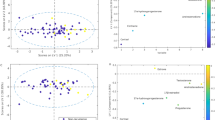Abstract
Purpose
Cortisol plays an important role in the physical status of patients with end-stage lung cancer, but the association of urine cortisol levels with TNM stage/performance status (PS) is unclear in patients with advanced lung cancer receiving chemotherapy. The objective of this study was to examine this association.
Methods
In this single-center, retrospective, observational study, cortisol concentrations in 24-h pooled urine from 22 patients with advanced lung cancer were measured over 2 days. The mean concentration in each patient was compared with PS, TNM stage, and serum sodium and potassium ion levels.
Results
The 24-h urine cortisol levels were higher in PS2 or PS3 cases compared to PS1 (p < 0.05) and increased proportionally with PS. Urine cortisol also increased in N2 or N3 cases compared to N1 (p < 0.01) and also increased in M1 cases (p < 0.05). Urine cortisol levels were negatively correlated with serum sodium (R = −0.49, p < 0.05) and had a tendency for a positive correlation with serum potassium (R = 0.40, p = 0.06).
Conclusion
The 24-h urine cortisol level increased in patients with advanced lung cancer undergoing chemotherapy. Low serum levels of potassium and high levels of sodium may indicate relative adrenal insufficiency.



Similar content being viewed by others
References
Moses AW, Slater C, Preston T, Barber MD, Fearon KC (2004) Reduced total energy expenditure and physical activity in cachectic patients with pancreatic cancer can be modulated by an energy and protein dense oral supplement enriched with n-3 fatty acids. Br J Cancer 90:996–1002
Bachmann J, Heiligensetzer M, Krakowski-Roosen H, Buchler MW, Friess H, Martignoni ME (2008) Cachexia worsens prognosis in patients with resectable pancreatic cancer. J Gastrointest Surg 12:1193–1201
Fearon KC, Voss AC, Hustead DS (2006) Definition of cancer cachexia: effect of weight loss, reduced food intake, and systemic inflammation on functional status and prognosis. Am J Clin Nutr 83:1345–1350
Moertel CG, Schutt AJ, Reitemeier RJ, Hahn RG (1974) Corticosteroid therapy of preterminal gastrointestinal cancer. Cancer 33:1607–1609
Yennurajalingam S, Frisbee-Hume S, Palmer JL, Delgado-Guay MO, Bull J, Phan AT, Tannir NM, Litton JK, Reddy A, Hui D, Dalal S, Massie L, Reddy SK, Bruera E (2013) Reduction of cancer-related fatigue with dexamethasone: a double-blind, randomized, placebo-controlled trial in patients with advanced cancer. J Clin Oncol 31:3076–3082
Russell DM, Shike M, Marliss EB, Detsky AS, Shepherd FA, Feld R, Evans WK, Jeejeebhoy KN (1984) Effects of total parenteral nutrition and chemotherapy on the metabolic derangements in small cell lung cancer. Cancer Res 44:1706–1711
Drott C, Svaninger G, Lundholm K (1988) Increased urinary excretion of cortisol and catecholami-NES in malnourished cancer patients. Ann Surg 208:645–650
Miller AH, Ancoli-Israel S, Bower JE, Capuron L, Irwin MR (2008) Neuroendocrine-immune mechanisms of behavioral comorbidities in patients with cancer. J Clin Oncol 26:971–982
Rhen T, Cidlowski JA (2005) Antiinflammatory action of glucocorticoids: new mechanisms for old drugs. N Engl J Med 353:1711–1723
Musselman DL, Miller AH, Porter MR, Manatunga A, Gao F, Penna S, Pearce BD, Landry J, Glover S, McDaniel JS, Nemeroff CB (2001) Higher than normal plasma interleukin-6 concentrations in cancer patients with depression: preliminary findings. Am J Psychiatry 158:1252–1257
Spiegel K, Leproult R, Van Cauter E (1999) Impact of sleep debt on metabolic and endocrine function. Lancet 354:1435–1439
Fishman D, Faulds G, Jeffery R, Mohamed-Ali V, Yudkin JS, Humphries S, Woo P (1998) The effect of novel polymorphisms in the interleukin-6 (IL-6) gene on IL-6 transcription and plasma IL-6 levels, and an association with systemic-onset juvenile chronic arthritis. J Clin Invest 102:1369–1376
Reichlin S (1993) Neuroendocrine-immune interactions. N Engl J Med 329:1246–1253
Salluh JI, Shinotsuka CR, Soares M, Bozza FA, Lapa e Silva JR, Tura BR, Bozza PT, Vidal CG (2010) Cortisol levels and adrenal response in severe community-acquired pneumonia: a systematic review of the literature. J Crit Care 25:e541–e548
Annane D, Sebille V, Troche G, Raphael JC, Gajdos P, Bellissant E (2000) A 3-level prognostic classification in septic shock based on cortisol levels and cortisol response to corticotropin. JAMA 283:1038–1045
Salluh JI, Bozza FA, Soares M, Verdeal JC, Castro-Faria-Neto HC, Lapa ESJR, Bozza PT (2008) Adrenal response in severe community-acquired pneumonia: impact on outcomes and disease severity. Chest 134:947–954
Bruno JJ, Hernandez M, Ghosh S, Pravinkumar SE (2012) Critical illness-related corticosteroid insufficiency in cancer patients. Support Care Cancer 20:1159–1167
Conflict of interest
The authors have no conflicts of interest regarding this publication.
Author information
Authors and Affiliations
Corresponding author
Rights and permissions
About this article
Cite this article
Suzuki, K., Ichikawa, T., Furuse, H. et al. Relationship of the urine cortisol level with the performance status of patients with lung cancer: a retrospective study. Support Care Cancer 23, 2129–2133 (2015). https://doi.org/10.1007/s00520-014-2585-5
Received:
Accepted:
Published:
Issue Date:
DOI: https://doi.org/10.1007/s00520-014-2585-5




